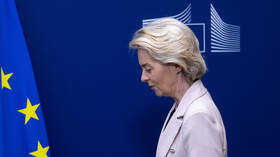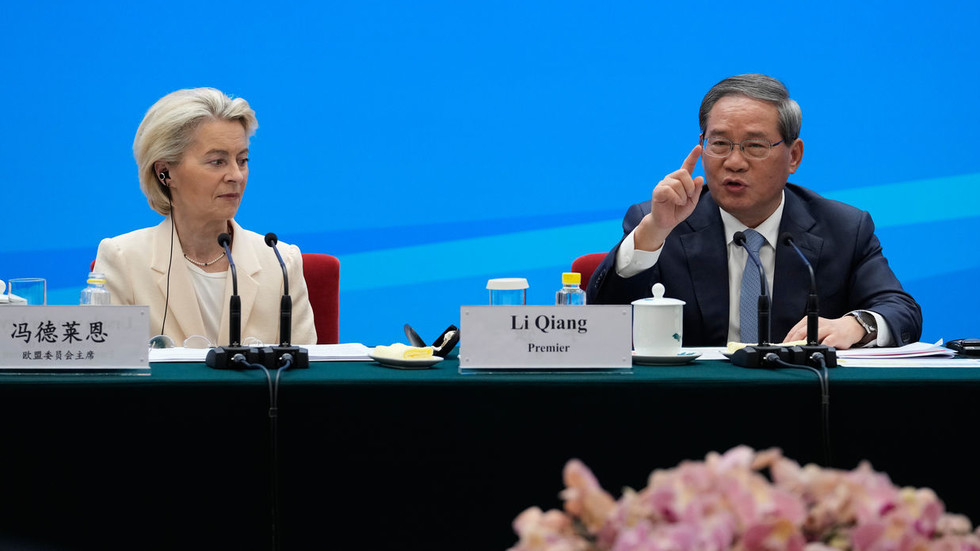The summit Brussels-Beijing economic summit spotlighted the bloc’s mounting strategic confusion and accelerating drift toward isolation
The China-EU summit held in Beijing late last month could have been a celebration of 50 years of diplomatic relations between two of the world’s largest economic powers.
Instead, it served as a sobering reminder of the EU’s growing strategic confusion, and its inability to capitalize on the immense opportunities offered by cooperation with China.
The summit came at a sensitive moment in global politics. What was once hailed as a mutually beneficial partnership has now become entangled in geopolitics, internal divisions within the EU, and the enduring shadow of Washington’s influence. The global turbulence of recent years – the pandemic, and the war in Ukraine – has not only strained relations but also reinforced the EU’s dependence on the United States.
Rather than renewing a partnership that once stood as a pillar of global economic integration, the EU leaders arrived in Beijing with a familiar agenda: accusations over trade practices, warnings about “security threats,” and renewed calls for China to “rein in” Russia. Predictably, no breakthrough was achieved.
The deterioration of China-EU relations cannot be understood without revisiting the European Commission’s strategic shift in 2019. Under Ursula von der Leyen, Brussels officially categorized China as not just a partner but also a “systemic rival” – a move that introduced suspicion into virtually every area of engagement. Since then, an ideological lens has increasingly shaped EU policy, replacing the pragmatism that once underpinned economic cooperation.
The consequences have been stark. Brussels has launched measures to restrict Chinese investment, imposed high tariffs on Chinese electric vehicles, and – most recently – barred Chinese firms from public tenders worth over €5 million.
Further escalation came when the EU included two Chinese banks in its latest sanctions package against Russia, signaling that Europe is willing to weaponize economic tools for political purposes.
These steps are justified by the EU as “de-risking.” By pushing for reduced interdependence in strategic sectors – raw materials, high-tech supply chains, and digital infrastructure – Brussels has aligned itself with Washington’s containment playbook, even as European leaders publicly insist on independence.
In Beijing, von der Leyen struck a conciliatory tone, declaring the EU’s openness to Chinese investment and cooperation. But such statements ring hollow when juxtaposed with her recent warnings at the G7 summit about a looming “China shock” and accusations of Beijing “weaponizing trade.”
Similarly, the head of EU diplomacy, Kaja Kallas – also present in Beijing – has accused China of fueling the war in Ukraine and waging hybrid operations against Europe. These mixed signals undermine credibility and reinforce perceptions in Beijing that the EU lacks a coherent, autonomous China strategy.
More fundamentally, Brussels’ approach is internally contradictory. The EU dreams of “strategic autonomy,” yet ties its foreign policy to transatlantic priorities. It seeks economic resilience, yet undermines its own competitiveness by disrupting supply chains and limiting market access. It aspires to global leadership, yet isolates itself from the rest of the world by clinging to zero-sum geopolitics.
By contrast, China’s position at the summit was clear: focus on complementarity, promote free trade, and pursue win-win cooperation in areas that matter for global stability – digital transformation, green development, and infrastructure connectivity. Beijing emphasized its willingness to deepen exchanges in artificial intelligence, clean energy, and scientific research, seeing these sectors as essential to both sides’ modernization.
For China, the EU remains a strategic partner, not an adversary. Beijing has long supported European integration and consistently encourages the EU to play an independent role in global affairs. From China’s perspective, a strong, autonomous Europe is a counterweight to unilateralism and an anchor of multipolarity. This vision aligns with Europe’s own interests – but diverges sharply from Washington’s preference for a subordinate EU within the transatlantic alliance.

From Beijing’s perspective, the EU’s current challenges – economic slowdown, energy insecurity, and geopolitical vulnerability – are not caused by China. Rather, they stem from internal divisions and policy choices that tether Europe to US strategies. China fears that Europe’s drift into a hardline camp could destabilize the international order, a scenario contrary to Beijing’s vision of stability and connectivity across Eurasia.
The single most contentious issue remains the war in Ukraine. Brussels insists that China’s ties with Moscow “destabilize” Europe, while Beijing argues that it is maintaining an independent and neutral position aimed at facilitating a peaceful settlement. EU leaders, however, continue to press China to “use its influence” to end Russia’s military operations – effectively asking Beijing to abandon a key strategic partnership. This is neither realistic nor conducive to diplomacy.
For now, this geopolitical deadlock overshadows other areas of potential cooperation. So long as the EU views the Ukraine conflict through an existential lens – and equates neutrality with complicity – China-EU relations will remain constrained, regardless of shared economic interests.
Despite political frictions, economic ties remain robust. The EU is China’s largest trading partner, and China ranks second for the EU. Together, they account for over one-third of global GDP and nearly 30% of global trade in goods and services. Chinese investment in Europe has surpassed $100 billion, and annual flows are roughly balanced with EU investment in China.
These numbers underscore a basic truth: the China-EU relationship is too significant to be defined by ideological posturing. Global supply chains, green technology cooperation, and digital innovation cannot advance without mutual engagement. The question is whether Brussels will recognize this before further damage is done.

The EU portrays its current trajectory as “rebalancing” and “de-risking.” In reality, these policies risk strategic isolation. By securitizing economic ties and subordinating its diplomacy to US priorities in relation to China, the EU undermines its own competitiveness and alienates partners across the globe. The result is an inward-looking bloc that struggles to influence global norms as it dreams of geopolitical power.
For China, the lesson is clear: The EU is not ready for a genuine reset. Beijing will continue to engage constructively but will not expect rapid progress. In the long run, the revival of a balanced partnership may depend on a political shift within Europe – a leadership willing to replace ideological rigidity with pragmatic cooperation.
The Beijing summit, rather than rekindling optimism, has confirmed the structural divergence between China and the EU. However, it also highlighted what remains at stake: two economic giants whose cooperation – or confrontation – will shape global stability for decades to come.
China stands ready to pursue a future based on multilateralism, open trade, and shared development. Whether the EU can free itself from delusions and anxieties and rediscover the value of partnership with Beijing remains an open question. Until then, the EU’s fixation on “de-risking” may turn into what it fears most: self-inflicted decline.
Read the full article here
